Dear Zazie, Here is today’s Lovers’ Chronicle from Mac Tag dedicated to his muse. Rhett
The Lovers’ Chronicle
Dear Muse,
© copyright 2021 mac tag/cowboy coleridge all rights reserved
© copyright 2019 mac tag/cowboy coleridge all rights reserved
Thanks Karen,
“I wish I could tame Time
I would train it to fetch
all those stolen moments;
I would feed it nothing
but the opposite of regret.”
then you had to go and say
i made you smile…
now my mind
is freshly boggled
i need a moment
to form coherent thoughts…
you continue to amaze
i am many things
but not a panderin’ fool
and i detest insipid platitudes
but i do not know
what else to say but that,
you continue to amaze
were you sent to remind me
that faith and hope and grace
still exist, no matter how many
times i have cursed them
and tossed them aside
i understand your wish
and here is mine…
to tame time
to bring back
all the lost moments
and feed it faith
and hope and grace
all just to get to you
© copyright 2017 mac tag/cowboy Coleridge all rights reserved
thanks again Karen
| Voltaire | |
|---|---|

Portrait by Nicolas de Largillière, c. 1724
|
|
Today is the birthday of François-Marie Arouet (Paris; 21 November 1694 – 30 May 1778 Paris), known by his nom de plume Voltaire; Enlightenment writer, historian, and philosopher famous for his wit, his attacks on the established Catholic Church, and his advocacy of freedom of religion, freedom of speech, and separation of church and state.
Voltaire was a versatile writer, producing works in almost every literary form, including plays, poems, novels, essays, and historical and scientific works. He wrote more than 20,000 letters and more than 2,000 books and pamphlets. He was an outspoken advocate of civil liberties, despite the risk this placed him in under the strict censorship laws of the time. As a satirical polemicist, he frequently made use of his works to criticize intolerance, religious dogma, and the French institutions of his day.
In 1733, Voltaire met Émilie du Châtelet, a married mother of three who was 12 years his junior and with whom he was to have an affair for 16 years. To avoid arrest after the publication of Letters, Voltaire took refuge at her husband’s château at Cirey-sur-Blaise, on the borders of Champagne and Lorraine. Voltaire paid for the building’s renovation, and Émilie’s husband, the Marquis du Châtelet, sometimes stayed at the château with his wife and her lover. The relationship had a significant intellectual element. Voltaire and the Marquise collected over 21,000 books.
Quotes
- La vertu s’avilit à se justifier.
- Virtue is debased by self-justification.
- Oedipe, act II, scene IV (1718).
- Virtue is debased by self-justification.
- On doit des égards aux vivants; on ne doit aux morts que la vérité.
- We should be considerate to the living; to the dead we owe only the truth.
- Letter to M. de Grenonville (1719).
- We should be considerate to the living; to the dead we owe only the truth.
- C’est un poids bien pesant qu’un nom trop tôt fameux.
- Quite a heavy weight, a name too quickly famous.
- La Henriade, chant troisième, l.41 (1722).
- Quite a heavy weight, a name too quickly famous.
- L’homme est libre au moment qu’il veut l’être.
- Man is free at the instant he wants to be.
- Source Brutus, act II, scene I (1730).
- Man is free at the instant he wants to be.
- Les mortels sont égaux; ce n’est pas la naissance,
C’est la seule vertu qui fait la différence.- All mortals are equal; it is not their birth,
But virtue itself that makes the difference.- Eriphile, act II, scene I (1732); these lines were also used in Mahomet, act I, scene IV (1741).
- All mortals are equal; it is not their birth,
- On parle toujours mal quand on n’a rien à dire.
- One always speaks badly when one has nothing to say.
- “Commentaires sur Corneille,” Oeuvres complètes de Voltaire (1827).
- One always speaks badly when one has nothing to say.
- Les anciens Romains élevaient des prodiges d’architecture pour faire combattre des bêtes.
- The ancient Romans built their greatest masterpieces of architecture for wild beasts to fight in.
- Letter addressed to “un premier commis” [name unknown] (20 June 1733), from Oeuvres Complètes de Voltaire: Correspondance [Garnier frères, Paris, 1880], vol. I, letter # 343 (p. 354).
- The ancient Romans built their greatest masterpieces of architecture for wild beasts to fight in.
- Où est l’amitié est la patrie.
- Where there is friendship, there is our natural soil.
- Letter to Nicolas-Claude Thieriot (1734).
- Where there is friendship, there is our natural soil.
- Tous les genres sont bons, hors le genre ennuyeux.
- All styles are good except the boring kind.
- L’Enfant prodigue: comédie en vers dissillabes (1736), Preface.
- All styles are good except the boring kind.
- Le superflu, chose très nécessaire.
- The superfluous, a very necessary thing.
- Variant translation: The superfluous is very necessary.
- Poem Le Mondain (1736).
- Le paradis terrestre est où je suis.
- Paradise on earth is where I am.
- Le Mondain (1736).
- Paradise on earth is where I am.
- Tout homme sensé, tout homme de bien, doit avoir la secte chrétienne en horreur.
- Every sensible man, every honorable man, must hold the Christian sect in horror.
- Examen important de milord Bolingbroke (1736): Conclusion.
- Every sensible man, every honorable man, must hold the Christian sect in horror.
- Aime la vérité, mais pardonne à l’erreur.
- Love truth, but pardon error.
- “Deuxième discours: de la liberté,” Sept Discours en Vers sur l’Homme (1738).
- Love truth, but pardon error.
- Usez, n’abusez point; le sage ainsi l’ordonne.
Je fuis également Épictète et Pétrone.
L’abstinence ou l’excès ne fit jamais d’heureux.- Use, do not abuse; as the wise man commands. I flee Epictetus and Petronius alike. Neither abstinence nor excess ever renders man happy.
- “Cinquième discours: sur la nature de plaisir,” Sept Discours en Vers sur l’Homme (1738).
- Use, do not abuse; as the wise man commands. I flee Epictetus and Petronius alike. Neither abstinence nor excess ever renders man happy.
- Le secret d’ennuyer est celui de tout dire.
- The secret of being a bore is to tell everything.
- “Sixième discours: sur la nature de l’homme,” Sept Discours en Vers sur l’Homme (1738).
- The secret of being a bore is to tell everything.
- Une seule partie de la physique occupe la vie de plusieurs hommes, et les laisse souvent mourir dans l’incertitude.
- A single part of physics occupies the lives of many men, and often leaves them dying in uncertainty.
- “A Madame la Marquise du Châtelet, Avant-Propos,” Eléments de Philosophie de Newton (1738).
- A single part of physics occupies the lives of many men, and often leaves them dying in uncertainty.
Le premier qui fut roi fut un soldat heureux:
Qui sert bien son pays n’a pas besoin d’aïeux.
- The first who was king was a fortunate soldier:
Who serves his country well has no need of ancestors.- Mérope, act I, scene III (1743). Borrowed from Lefranc de Pompignan’s “Didon”.
- Les habiles tyrans ne sont jamais punis.
- Clever tyrants are never punished.
- Mérope, act V, scene V (1743).
- Clever tyrants are never punished.
- Il vaut mieux hasarder de sauver un coupable que de condamner un innocent.
- It is better to risk sparing a guilty person than to condemn an innocent one.
- Zadig (1747).
- It is better to risk sparing a guilty person than to condemn an innocent one.
- Qui plume a, guerre a.
- To hold a pen is to be at war.
- Letter to Jeanne-Grâce Bosc du Bouchet, comtesse d’Argental (4 October 1748)
- This remark also appears in a letter to Marie-Louise Denis (22 May 1752): To hold a pen is to be at war. This world is one vast temple consecrated to discord [Qui plume a, guerre a. Ce monde est un vaste temple dédié à la discorde].
- To hold a pen is to be at war.
- C’est une des superstitions de l’esprit humain d’avoir imaginé que la virginité pouvait être une vertu.
- It is one of the superstitions of the human mind to have imagined that virginity could be a virtue.
- Notebooks (c.1735-c.1750)
- Note: This quotation and the three that follow directly below are from the so-called Leningrad Notebook, also known as Le Sottisier; it is one of several posthumously published notebooks of Voltaire.
- It is one of the superstitions of the human mind to have imagined that virginity could be a virtue.
- Prier Dieu c’est se flatter qu’avec des paroles on changera toute la nature.
- To pray to God is to flatter oneself that with words one can alter nature.
- Notebooks (c.1735-c.1750).
- To pray to God is to flatter oneself that with words one can alter nature.
- Nous cherchons tous le bonheur, mais sans savoir où, comme les ivrognes qui cherchent leur maison, sachant confusément qu’ils en ont une.
- We all look for happiness, but without knowing where to find it: like drunkards who look for their house, knowing dimly that they have one.
- Notebooks (c.1735-c.1750)
- We all look for happiness, but without knowing where to find it: like drunkards who look for their house, knowing dimly that they have one.
- Les opinions ont plus causé de maux sur ce petit globe que la peste et les tremblements de terre.
- Opinions have caused more ills than the plague or earthquakes on this little globe of ours.
- Letter to Élie Bertrand (5 January 1759).
- Opinions have caused more ills than the plague or earthquakes on this little globe of ours.
- Mari qui veut surprendre est souvent fort surprise.
- Translation: The husband who decides to surprise his wife is often very much surprised himself.
- La Femme Qui a Raison, Act 1, scene 2 (1759)
- Quand il s’agit d’argent, tout le monde est de la même religion.
- When it is a question of money, everybody is of the same religion.
- Letter to Mme. d’Épinal, Ferney (26 December 1760) from Oeuvres Complètes de Voltaire: Correspondance (Garnier frères, Paris, 1881), vol. IX, letter # 4390 (p. 124).
- When it is a question of money, everybody is of the same religion.
- Il y a des vérités qui ne sont pas pour tous les hommes et pour tous les temps.
- There are truths which are not for all men, nor for all times.
- Letter to François-Joachim de Pierre, cardinal de Bernis (23 April 1764).
- There are truths which are not for all men, nor for all times.
- Les hommes seront toujours fous; et ceux qui croient les guérir sont les plus fous de la bande.
- Men will always be mad, and those who think they can cure them are the maddest of all.
- Letter to Louise Dorothea of Meiningen, duchess of Saxe-Gotha Madame (30 January 1762).
- Men will always be mad, and those who think they can cure them are the maddest of all.
- Quoi que vous fassiez, écrasez l’infâme, et aimez qui vous aime.
- Whatever you do, crush the infamous thing, and love those who love you.
- Letter to Jean le Rond d’Alembert (28 November 1762); This was written in reference to crushing superstition, and the words “écrasez l’infâme” (“Crush the Infamy”) became a motto strongly identified with Voltaire
- Whatever you do, crush the infamous thing, and love those who love you.
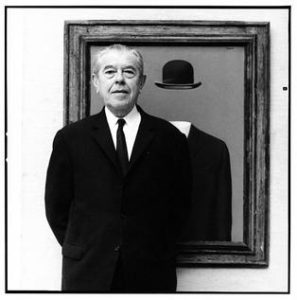 Today is the birthday of René François Ghislain Magritte (Lessines, Belgium; 21 November 1898 – 15 August 1967 Brussels); surrealist artist. He became well known for creating a number of witty and thought-provoking images. Often depicting ordinary objects in an unusual context, his work is known for challenging observers’ preconditioned perceptions of reality. His imagery has influenced Pop art, minimalist and conceptual art.
Today is the birthday of René François Ghislain Magritte (Lessines, Belgium; 21 November 1898 – 15 August 1967 Brussels); surrealist artist. He became well known for creating a number of witty and thought-provoking images. Often depicting ordinary objects in an unusual context, his work is known for challenging observers’ preconditioned perceptions of reality. His imagery has influenced Pop art, minimalist and conceptual art.
Magritte married Georgette Berger in June 1922. Georgette was the daughter of a butcher in Charleroi, and had first met Magritte when she was only 13 and he was 15. They met again in Brussels in 1920 and Georgette subsequently became Magritte’s model and muse. In 1936 Magritte met a young artist, Sheila Legge, and began an affair. Magritte arranged for his friend, Paul Colinet, to entertain and distract Georgette, but this led to an affair between his wife and Colinet. Magritte and his wife did not reconcile until 1940.
Magritte died of pancreatic cancer on 15 August 1967, aged 68, and was interred in Schaerbeek Cemetery, Evere, Brussels.
Gallery
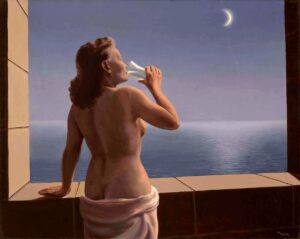
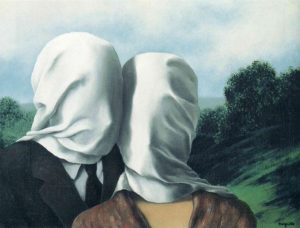
The Lovers 1928
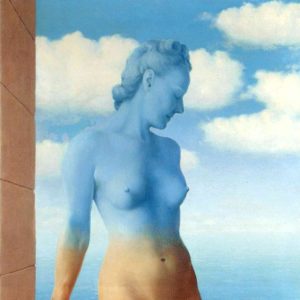

Night and Day
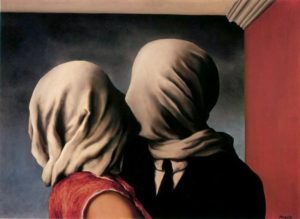
The Lovers
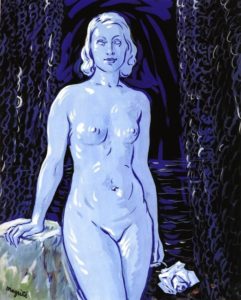
Black Magic
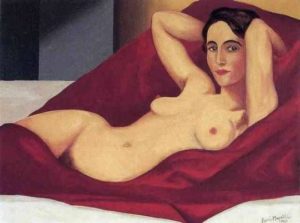
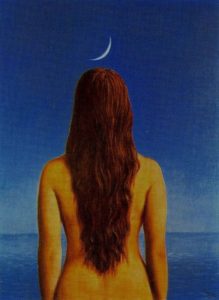
The Evening Gown
Mac Tag

22/11/2017 at 2:30 pm Permalink
Another beautiful musing that opens the mind. Have a Blessed Thanksgiving tomorrow